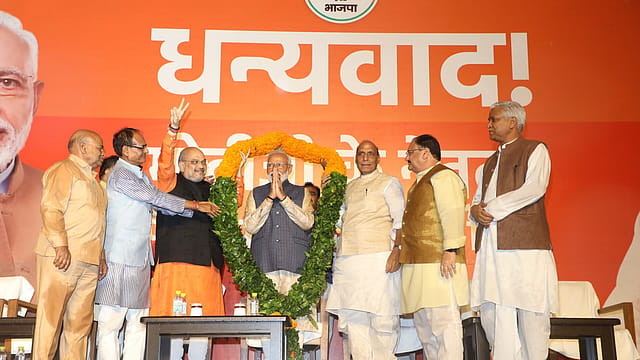Overwhelming mandate to lead to broad-based growth
ADVERTISEMENT

NDA’s sweep to power for the second consecutive term is an overwhelming mandate in favour of economic stability and continuity. India Inc., analysts, domestic and foreign investors have wholeheartedly welcomed the incumbent government’s return to power with an expectation that the new government under the leadership of Narendra Modi, buoyed by the electoral dividends will intensify its economic reforms in a more focused manner so that India becomes a resurgent economy and an attractive investment destination globally.
It has been a sentiment-boosting verdict for stock markets, as the Sensex hit 40,000-level soon after markets got whiff of the results. The uncertainty and anxiety which engulfed the economy before the election due to political developments and liquidity squeeze has now given way to renewed optimism and revival of hope. However, without undermining the importance of a stable government with sustained focus on development and growth, one should take cognisance of the present economic scenario which requires urgent attention from the government. Industrial growth has remained muted due to declining investment level, subdued growth (5%) in exports over the last five years and stagnating GDP (7%). Add to that liquidity crisis affecting NBFCs, IL&FS saga and Jet Airways defaults on load repayment.
Therefore, amidst the ecstasy of winning the second term in office, the government needs to set its priority right to put the economy firmly on the growth path. A comprehensive roadmap has to be prepared on an urgent basis.
For instance, inflation remains a key concern area for the government and the government needs to check inflation from spinning out of control and keep it within the comfort zone to provide the necessary legroom to the RBI to reduce rates further at the next MPC meet.
The government will also need to set its priority right in checking fiscal slippage which largely depends on how deficit spending is avoided. However, given the finances, there remains little headroom for the government to raise budgetary and extra-budgetary recourses unless innovative methods of raising funds are devised. The most important task set out for the government would be to perk up growth against the background of the consumption story losing steam.
In its second stint in power, the NDA government will also have to accord priority focus to creating jobs. As the employment generation in the manufacturing sector has been moderate, the government will have to devise alternate avenues to bolster the pace of employment generation. This will help improving income levels and boost demand to put the consumption theme back in reckoning. Employment generation is not an end in itself and the government will have to ensure an increase in wages at inflation beating rates to save the country from side-stepping into the so-called “middle income trap”.
The government will have to explore ways to expand trade since exports remain inelastic and imports are susceptible to the volatilities in the INR-USD rate, leading to a widening trade deficit. Key measures will need to be rolled out on a priority basis to revive job-intensive export oriented MSMEs.
A crisis-laden NBFC sector saddled with liquidity squeeze and reduced market access remains a challenge area for the government. The government will have to initiate suitable policy interventions and capital infusion to bring the sector out of the blues by getting the RBI on board. Suitable precautions will need to be taken to ensure that the wider public interest is protected and a ripple effect of non-bank problems into other sectors is prevented.
In addition, there is an urgent need on streamlining the GST structure further to widen its coverage and bring more sectors like real estate within its ambit. Priority should be on to improve the Tax: GDP ratio. Land reforms are a key focus area which need to be addressed to ensure that vital infra projects get off the ground without any impediment. Labor laws will also need to be rationalised.
Initiating land, tax and labor reforms in a cumulative manner and a revival in consumption demand will boost the earnings and profit outlook for corporates. This, in turn, will help in reviving the private capex cycle.
The anticipation after the massive pro-development verdict is that the government will take some concrete measures to implement broad-based economic growth which will take India to the next growth trajectory.
Views are personal.
The author is executive director at Geojit Financial Services